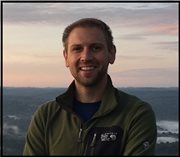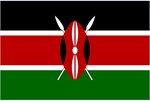Cody Nelson
 Cody grew up in southern Oregon and then attended the University of Southern California, where he majored in biochemistry and history. After graduating in 2012, he entered the MD/PhD program at Duke University in Durham, NC. He completed his dissertation research in the lab of Sallie Permar, MD, studying cytomegalovirus vaccine immunology. His project examined protective antibody responses generated against CMV using clinical samples and a nonhuman primate model of congenital transmission. Following graduation in 2018, Cody completed a yearlong international post-doctoral research year with 2018 Bailey K. Ashford recipient Wendy Prudhomme O’Meara, PhD, in Eldoret, Kenya. His project revolved around using malaria parasite genomic material to understand spatial and temporal scales of malaria transmission. When not in the lab, he said he tries to be outside as much as possible – hiking/backpacking, running, cycling, skiing, golfing and kayaking.
Cody grew up in southern Oregon and then attended the University of Southern California, where he majored in biochemistry and history. After graduating in 2012, he entered the MD/PhD program at Duke University in Durham, NC. He completed his dissertation research in the lab of Sallie Permar, MD, studying cytomegalovirus vaccine immunology. His project examined protective antibody responses generated against CMV using clinical samples and a nonhuman primate model of congenital transmission. Following graduation in 2018, Cody completed a yearlong international post-doctoral research year with 2018 Bailey K. Ashford recipient Wendy Prudhomme O’Meara, PhD, in Eldoret, Kenya. His project revolved around using malaria parasite genomic material to understand spatial and temporal scales of malaria transmission. When not in the lab, he said he tries to be outside as much as possible – hiking/backpacking, running, cycling, skiing, golfing and kayaking.

Malaria species identification and parasite genetic interrelatedness in an emerging malaria zone in northern Kenya
9/01/2019 - 11/15/2019
Kenya
What does the Kean Fellowship mean to you?
It is an honor to receive the Kean Fellowship to continue exploring my research interest in tropical infectious diseases. I hope this project will provide opportunity for continued mentorship in the research I envision for my future career and also to be a springboard for future research projects/funding. Furthermore, the Kean Fellowship will allow us to continue to develop local capacity within the new Partnership for Education And Research Laboratory (PEARL) in western Kenya – a collaborative enterprise between Duke University, Moi University and Webuye County Teaching Hospital.
What do you anticipate learning?
The overall project objective is molecular epidemiologic surveillance of malaria in the Turkana basin region of northern Kenya, a unique ecological zone at the border area between Kenya, Uganda, Ethiopia and Somalia. The Turkana basin has long been considered outside the malaria risk map, but has suffered large-scale, severe epidemic outbreaks in recent years. I will seek to: 1) Identify the relative prevalence of malaria parasite species circulating in the Turkana region, and 2) Quantify the genetic interrelatedness of malaria parasites in Turkana in comparison to a region with endemic, year-round transmission in western Kenya. This project has the potential to dramatically advance our understanding of malaria epidemiology in Turkana and, more generally, of transmission networks and parasite population interrelatedness for emerging/epidemic vs. endemic malaria spread.
What interests you about tropical medicine and what problems are you interested in solving?
I have always had an intellectual interest in infectious diseases. I envision that as a tropical medicine researcher/practitioner, my work will have the potential to impact the lives of millions of people worldwide, including those with or without economic resources or political influence. My research goals center around understanding host-pathogen dynamics of tropical infectious diseases affecting pregnant women and children. I envision that my future research career will involve human cohorts and a combination of immunologic and molecular genomic tools to understand the biology of pathogen transmission and disease, with the ultimate goal to improve therapeutic interventions and prevent childhood morbidity/mortality.